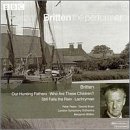| All Artists: Britten, Dennis Brain, Margaret Major, Lso Title: Our Hunting Fathers / Who Are These Children Members Wishing: 0 Total Copies: 0 Label: BBC Legends Release Date: 1/11/2000 Album Type: Original recording remastered Genres: Pop, Classical Styles: Vocal Pop, Opera & Classical Vocal, Chamber Music, Historical Periods, Modern, 20th, & 21st Century, Instruments, Strings, Symphonies Number of Discs: 1 SwapaCD Credits: 1 UPC: 684911801422 |
Search - Britten, Dennis Brain, Margaret Major :: Our Hunting Fathers / Who Are These Children
 | Britten, Dennis Brain, Margaret Major Our Hunting Fathers / Who Are These Children Genres: Pop, Classical
|
Larger Image |
CD Details |
CD ReviewsThey Are Our Past And Our Future Hong Kong Pol | Hong Kong Hong Kong | 05/15/2004 (4 out of 5 stars) "Our Hunting Fathers, a piece from the 1930s, reminds us that to be modern you do not have to be born in 1984, and that political commitment need not ask the listener to sacrifice musical integrity or even enjoyment.This wonderful combination of Auden's poetry, Britten's music and Peter Pears' extraordinary vocal agility and incisiveness can be listened to in many ways. Let me get my only complaint out the way early: the CD transfer fails to put across the fluidity of Pears' tone, which is noticeably thinner than on the BBC Classics vinyl version.Pears catches the sadness and outrage of the pacifist faced with the wanton slaughter of animals by the English aristocracy; but the political allegory with the deaths of the 1930s from Fascist adventurism in Africa and elsewhere is quite clear. And in the melismata and sudden irruptions of fury as the word "rats!" is interjected into the next song, Pears is without equal (rats being Fascists, again), even compared to the excellent Ian Bostridge. In 'Messalina', Pears conveys perfectly the combination of seriousness and foolishness that is the child's grief for a lost loved thing - her monkey, in this case - perfectly and with perfect empathy, his voice falling away as Messalina blames the world for her loss, her sighs of `fie, fie, fie..." morphing into the song "Dance of Death" that follows. The sheer exhilaration of this hunting song, Pears making amazing vocal leaps, crying out the names of the dogs, calling on the hawks to fly, carries all before it, trap drums rattling, until the final slow and deliberate juxtaposition of the names of just two hunting dogs, 'German, Jew', the oppressor and the victim, makes the political intent clear. Despite the seriousness of the themes treated (we should not be embarrassed by seriousness in this age of wars in foreign places), the music is at all times a joy - apt, energetic, dramatic, sad, humbling, thoughtful - and the performance of such intensity, energy and sheer 'rightness' that it leaps across the 70 years since it was written and 45 years since the performance was recorded, as if it was written for today: but then, Britten was only 23 years old when he wrote the music; and when Pears declaims Auden's words: "Oh Pride, so hostile to our charity!", we feel driven to look into ourselves and reflect how we may, perhaps, share responsibility for the troubles of today's world. One must search long and hard to find singing so expressive of the highest literary and musical quality! As the opening words put it, prophetically, of the opposites of destruction and creation: "They are our past and our future..." The companion piece is well performed, but cannot hold a candle to the first, which must have had the English country squires sitting up shocked in their chairs at first performance!"
|

 Track Listings (19) - Disc #1
Track Listings (19) - Disc #1